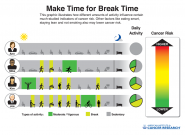There’s strong research now showing that being active can reduce your risk of colorectal cancer, but how physical activity affects survivors of this cancer is not as clear. Now comes a study suggesting that being active — both before and after diagnosis —can lengthen survival for colorectal cancer survivors.
Not watching a lot of television — a common measure for sedentary living — was also found to improve survival. Survivors who were watching fewer than two hours a day of TV before diagnosis had a reduced risk of mortality compared to those watching five or more hours of TV a day.
The study was published in the Journal of Clinical Oncology last week.
For pre-diagnosis, study authors used data from approximately 3,800 survivors who were part of the large NIH-AARP Diet and Health Study study. In the mid 1990s, the participants were 50 to 71 years old. They answered questionnaires about how much TV they watched, their activity and other lifestyle habits. Those who had developed colorectal cancer were identified in 2006.
About half of these survivors filled out another questionnaire in 2004, which was used for post-diagnosis data.
Before diagnosis, any amount of reported walking, playing sports and doing other leisure time physical activity reduced the risk of mortality during the time period when compared to those reporting no activity.
Those who reported being active in some way for seven or more hours a week had a 20% lower risk of mortality during the time period compared to those reporting no activity. After diagnosis, being active at least seven hours a week lowered risk of dying slightly more — 31% — again, compared to those who reported being inactive. This link was found after taking into account patient’s BMI, treatment, tumor stage and other factors that can affect risk of dying.
And people reporting watching five hours or more of TV a day before being diagnosed with cancer had a 22% increased risk of dying compared to those watching less than a couple hours a day.
“The take-home message is really about both more physical activity and less TV,” wrote author Hannah Arem, a postdoctoral fellow with the U.S. National Cancer Institute’s nutritional epidemiological branch, in an email. “We found that after diagnosis CRC survivors who watched less TV and did more exercise had the lowest mortality compared to those who watched more TV and did less exercise.”
 TV watching is reportedly the most common sedentary behavior, and this study adds to the evidence suggesting that both physical activity and inactivity matter for health and survival. We’ve highlighted the emerging research on inactivity and cancer risk over the past few years. We even made an infographic on it (see above).
TV watching is reportedly the most common sedentary behavior, and this study adds to the evidence suggesting that both physical activity and inactivity matter for health and survival. We’ve highlighted the emerging research on inactivity and cancer risk over the past few years. We even made an infographic on it (see above).
The study is cited as being supported, in part, by the Intramural Research Program of the National Institutes of Health, National Cancer Institute (Bethesda, MD).






I suspect that this may be true for other types of cancers and/or diseases as well.